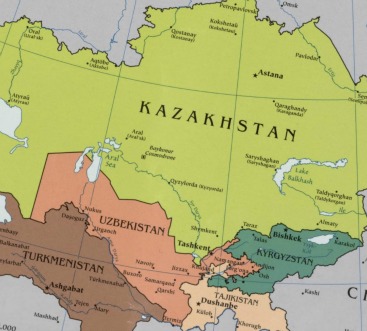Mr. Speaker, I rise today to introduce a resolution on the disturbing state of democratization and human rights in Central Asia. As is evident from many sources, including the State Department’s annual reports on human rights, non-governmental organizations, both in the region and the West, and the work of the Helsinki Commission, which I chair, Central Asia has become the “black hole” of human rights in the OSCE space.
True, not all Central Asia countries are equal offenders. Kyrgyzstan has not joined its neighbors in eliminating all opposition, tightly censoring the media and concentrating all power in the hands of the president, though there are tendencies in that direction, and upcoming elections in 2000 may bring out the worst in President Akaev. But elsewhere, the promise of the early 1990’s, when the five Central Asian countries along with all former Soviet republics were admitted to the Conference on Security and Cooperation in Europe, has not been realized.
Throughout the region, super-presidents pay lip service to OSCE commitments and to their own constitutional provisions on separation of powers, while dominating the legislative and judicial branches, crushing or thwarting any opposition challenges to their factual monopoly of power, and along with their families and favored few, enjoying the benefits of their countries’ wealth. Indeed, though some see the main problem of Central Asia through the prism of real or alleged Islamic fundamentalism, the Soviet legacy, or poverty, I am convinced that the essence of the problem is more simple and depressing: presidents determined to remain in office for life must necessarily develop repressive political systems.
To justify their campaign to control society, Central Asian leaders constantly point to their own national traditions and argue that democracy must be built slowly. Some Western analysts, I am sorry to say, have bought this idea, in some cases, quite literally, by acting as highly paid consultants to oil companies and other business concerns. But, Mr. Speaker, building democracy is an act of political will above all. You have to want to do it. If you don’t, all the excuses in the world and all the state institutions formed in Central Asia ostensibly to promote human rights will remain simply window dressing.
Moreover, the much-vaunted stability offered by such systems is shaky. The refusal of leaders to allow turnover at the top or newcomers to enter the game means that outsiders have no stake in the political process and can imagine coming to power or merely sharing in the wealth only be extra-constitutional methods. For some of those facing the prospect of permanent exclusion, especially as living standards continue to fall, the temptation to resort to any means possible to change the rules of the game, may be overwhelming. Most people, however, will simply opt out of the political system in disillusionment and despair.
Against this general context, without doubt, the most repressive countries are Turkmenistan and Uzbekistan. Turkmenistan’s President Niyazov, in particular, has created a virtual North Korea in post-Soviet space, complete with his own bizarre cult of personality. Turkmenistan is the only country in the former Soviet bloc that remains a one-party state. Uzbekistan, on the other hand, has five parties but all of them are government-created and controlled. Under President Islam Karimov, no opposition parties or movements have been allowed to function since 1992. In both countries, communist-era controls on the media remain in place. The state, like its Soviet predecessor, prevents society from influencing policy or expressing its views and keeps the population intimidated through omnipresent secret police forces. Neither country observes the most fundamental human rights, including freedom of religion, or permits any electoral challenges to its all-powerful president.
Kazakstan’s President Nursultan Nazarbaev has played a more clever game. Pressed by the OSCE and Western capitals, he has formally permitted opposition parties to function, and they did take part in the October 10 parliamentary election. But once again, a major opposition figure was not able to participate, and OSCE/ODIHR monitors, citing many shortcomings, have criticized the election as flawed. In general, the ability of opposition and society to influence policymaking is marginal at best. At the same time, independent and opposition media have been bought, coopted or intimidated out of existence or into cooperation with the authorities, and those few that remain are under severe pressure.
Tajikistan suffered a devastating civil war in the early 1990’s. In 1997, war-weariness and a military stalemate led the disputants to a peace accord and a power-sharing agreement. But though the arrangement had promise, it now seems to be falling apart, as opposition contenders for the presidency have been excluded from the race and the major opposition organization has decided to suspend participation in the work of the National Reconciliation Commission.
Mr. Speaker, along with large-scale ethnic conflicts like Kosovo or Bosnia, and unresolved low-level conflicts like Nagorno-Karabakh and Abkhazia, I believe the systemic flouting of OSCE commitments on democratization and human rights in Central Asia is the single greatest problem facing the OSCE. For that reason, I am introducing this resolution expressing concern about the general trends in the region, to show Central Asian presidents that we are not taken in by their facade, and to encourage the disheartened people of Central Asia that the United States stands for democracy. The resolution calls on Central Asian countries to come into compliance with OSCE commitments on democracy and human rights , and encourages the Administration to raise with other OSCE states the implications for OSCE participation of countries that engage in gross and uncorrected violation of freely accepted commitments on human rights . Mr. Speaker, I hope my colleagues will join me, Mr. Hoyer, and Mr. Forbes in this effort and we welcome their support.






